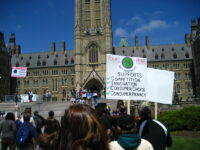Since the release of the Broadcast and Telecommunications Legislative Review Panel report late last month, I’ve posted on several key issues including an overview of concerns, news regulation, Canadian Heritage Minister Guilbeault’s comments, net neutrality, discoverability claims, consumer costs, and a podcast debate with panel chair Janet Yale. The blog now shifts for the next two days on trade-related concerns arising from the report’s recommendations. This issue is particularly timely since the House of Commons has been debating Bill C-4, the implementation bill for the US-Canada-Mexico (USMCA) Trade Agreement and the government had made treaty implementation one of its top legislative priorities.
News
Higher Costs and Less Choice: Why Consumers Will Pay the Price for the Broadcast Panel’s Plans to Increase Costs of Internet Services and Sites
In the months leading up to the release of the Broadcast and Telecommunications Legislative Review Panel report, there was considerable focus on whether it would recommend a “Netflix tax”, a catch-all term that has come to mean digital sales taxes, corporate taxes, and mandated contributions to support the production of Canadian content. The report contains a curious paragraph in its overview in which it claims that the panel is not recommending a Netflix tax. It states:
We want to be clear that we are not recommending that Canadian content be supported by the so-called ‘Netflix Tax’ – charging consumers an extra levy on subscriptions to such services as Netflix. It is more appropriate to establish a regime that requires such online streaming services that benefit from operating in Canada to invest in Canadian programming that they believe will attract and appeal to Canadians. This approach would ensure a meaningful contribution to Canadian cultural policy objectives and the production sector. It need not result in higher prices for consumers.
The reference to a Netflix tax in the overview is the only such reference in the 235 page report. It was likely included in the overview in the hope that media coverage would jump on the claim and seek to re-assure Canadians that there was no Netflix tax or higher prices likely for consumers as a result of the report’s recommendations.
Yet the reality for anyone that reads beyond the overview is that the panel’s report not only recommends what would widely be considered a Netflix tax but proposes perhaps the biggest Internet cash grab in the OECD with mandated payments and levies on thousands of Internet services with Canadian users.
The Broadcast Panel Report and Discoverability of Canadian Content: Searching for Evidence of a Problem
The Broadcast and Telecommunications Legislative Review Panel report places considerable emphasis on the need to support the “discoverability” of Canadian content. The term appears repeatedly in the report as discoverability of Canadian content is treated as an equivalent goal to creation and production. Given the panel’s view of its importance, it recommends that all media content undertakings (other than some news organizations) be subject to discoverability requirements:
The CRTC must also be able to impose discoverability measures on media content companies. Consumers now have access to an endless choice of content, making it difficult to find, or simply recognize, Canadian content. In fact, a majority of consumers have said that they have difficulty finding content they want to watch. Further, algorithms and AI-based processes have a major influence on program recommendations with a consequent influence on the discoverability of content.
Not Neutral: Why the Broadcast Panel Report Weakens Net Neutrality in Canada
Net neutrality featured prominently in the launch of the Broadcasting and Telecommunications Legislative Review Panel in 2018 with the government release stating “the review will be guided by the principle of net neutrality and will explore opportunities to further enshrine in legislation the principles of net neutrality in the provision and carriage of all telecommunications services.” The panel report includes a section on net neutrality which affirms support for the principle and which features two recommendations – one calls for a policy objective in the Telecommunications Act “to reflect the duty to safeguard open Internet access in Canada” and a second that calls on the CRTC to increase data gathering and reporting on open Internet access policies.
Weak Walk-Back: Why Steven Guilbeault’s Reversal on Government Licensing News Sites Still Leaves a Huge Regulatory Structure in Place
Canadian Heritage Minister Steven Guilbeault yesterday attempted to walk-back comments from the weekend in which he said regulating news sites “was no big deal.” Guilbeault now says the government does not intend to require licences or registration from “news agencies.” When asked repeatedly how to draw the line between “news agencies” (which is not a term used in the Broadcast and Telecommunications Legislative Review Panel report) and other news sources, Guilbeault was unable to provide a clear answer. Despite the lack of specifics, Guilbeault maintains that he still intends to introduce legislation within months.
While the decision to reject mandatory licensing or registration of some news services is a good step, it is nowhere near enough. The BTLR envisions a massive regulatory structure with the CRTC empowered to regulate Internet sites and services worldwide. There are few limits to what is covered: social media services, online streaming services, news aggregators, communications services such as Skype, podcasting sites, app stores, operating systems, and device manufacturers are all somehow considered part of the “system” and potentially subject to regulation and mandated payments.











